In the first Princh Library Blog post of 2023, Misskoko the Librarian shares her advice on how you and your library can start using social media SEO to be more visible on the World Wide Web. Read below for tips, best practices and examples!
In Libraries, there is usually one person doing all the Marketing, including Social Media, Video Making, Updating the Website, and SEO of the lot.
Today we are going to break down what you need to know about SEO and how Social Media SEO can help you get your library noticed, without having to pay for ads.
Learn the key aspects of Princh! Watch our on-demand demos at your convenience and see what makes Princh such a simple solution. Watch our demos here.
SEO
Let’s start with SEO which stands for Search Engine Optimisation. As you guessed, SEO relates to searching and making your library visible to search engines, which today basically means being visible to Google. When you delve into the SEO rabbit hole terms like backlinks, algorithm, click-through rate and heading tags get thrown about. There are courses on how to understand and DO good SEO, so it is no wonder people who “do it all” for their Library’s Marketing feel overwhelmed just thinking about it.
But even doing the basics of SEO will boost your library’s website in search ranking. So those basics? As Robin Jeanne, guest writer for the wonderful Princh Blog discusses in a previous post, “make use of relevant keywords… For instance, adding summaries with common search terms to the publications in your library will help them appear on Google as excellent matches to a user’s search query. The more visible your optimised content, the greater chances of your online library getting a click.”
Also, make sure to generate as many useful backlinks as you can. A backlink is a hyperlink from a third-party website to yours. Backlinks are an indicator to search engines that this webpage is useful for this keyword. Therefore, the more links you can get back to your webpages, the higher Google will rank you. For instance, in the previous paragraph, I linked back to another blog post by Princh that has relevant content to my topic. This is called link building, a strategy that backlinking is part of. See what I did there, SEO in action!
Social Media
Social Media is something everyone today knows how to use. It’s a term that covers all the chatting, community, content sharing applications, and websites that are around. When it comes to Library Marketing, we mostly use social media such as Facebook, LinkedIn, Twitter, Instagram, and YouTube. But there are many more social media channels out there! Because social media is so widely used, it becomes useful for our SEO strategies.
If you search for information about social media SEO, you’ll notice that there is lots of debate about its usefulness. But how, specifically, social media SEO helps our overall SEO strategies is through keywords, social signals and link building through backlinks. So, it’s not actually stuff like encoding the right heading tags into your social media efforts.
Now stay with me here, this is where I get a bit technical.
Social Media SEO
When search engines are looking for things to verify that your website is what YOU say it is, it checks that your name, address, and phone are the same wherever it finds them mentioned with your library’s name. If that checks out, then search engines will provide your website as an answer if a person types in, say, “Libraries near me”.
Search engines also want to show useful information. A big way search engines judge usefulness is if lots of people have linked to your content on their own website or social media. Basically, if they have backlinked to your stuff.
Using your social media is an easy way to backlink to your website. In fact, content on social media has a greater chance of reaching people who are already interested in your library. Therefore, they are more likely to click and engage well. Social media also has the bonus of being easily shared, reposted, or quoted. That means, yes! More backlinks to your website.
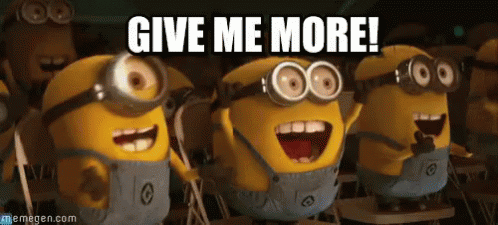
And all this backlinking to your website from social media creates in SEO terms – social signals. Search engines use these to judge the expertise, authoritativeness, and trustworthiness (EAT) of your content. If you tick all the EAT boxes, then you are well on your way to having all YOUR libraries’ online presence (including your various social media) show up on the coveted first page of any search query that you fulfil.
Having active social media profiles for your library can also increase your overall trustworthiness in search engines’ eyes. It can do the same in the human eyes trying to find out more about you too. If you have no social media, or a poor one, it can be a red flag to your patrons. Social media gives you a chance to humanise your library and connect with people. If you manage to build a community around your library that participates and chats with you online, not only is that a great cue to people checking you out – but search engines love also boosting active profiles and websites in search results.
Let’s see it in practice!
Ok, we’ve covered how link building using your social media accounts boosts the effectiveness of your SEO strategy. Now we are going to cover keywords. Because really, backlinking and keywords are two simple SEO strategies that go hand in hand. According to WixBlog’s SEO glossary, “keywords are two to five-word phrases that your potential clients would type into a search engine when looking for you… Choosing the right keywords for your web pages is essential if you wish to obtain more organic traffic from an audience with a specific intent.” This means you need to think of all the key phrases that people could use to find YOU.
It’s also a great idea to create branded keywords, something short and sweet that people can type into search engines and any online presence you have will pop up.
Let me highlight how important it is to have keywords in your website SEO and in your social media. Using SEMRush’s keyword finder, I typed in the phrase I always use to find one of my favourite libraries: PMI Library. As you can see, it is a small library with hits on the 2 variations of the target phrase.
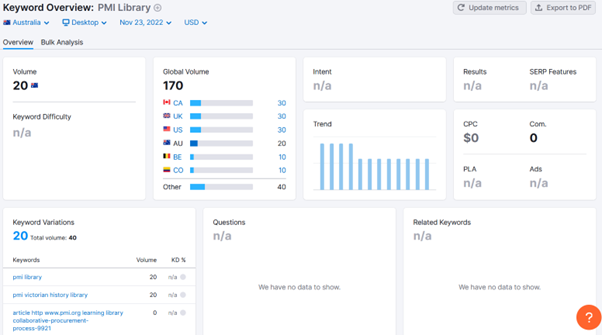
Thing is, PMI Library isn’t even the actual name of the library. It is the Prahran Mechanics Institute Victorian History Library. But when I type that into the keyword search tool, it is not used nearly as much as the shortened version that “everyone knows”.
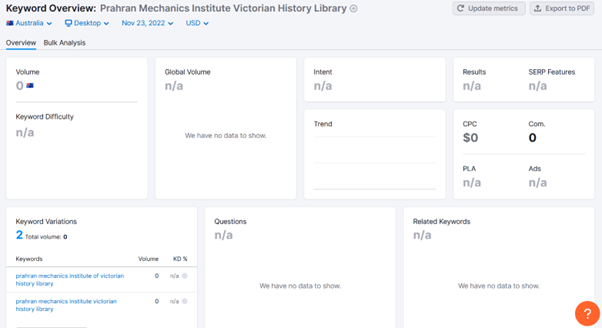
This is why it is handy to create brand keywords. Search engines can use these keywords as indicators that the content within your website or social media is relevant to what the person searching wants to know. In my business Misskoko the Librarian I have scattered the keyword Misskokolib across my socials and website. So, if you type Misskokolib into a search engine, I can guarantee you that all first page results are me.
I promise not to overload you with anymore technical talk. So, let’s summary what was covered today:
- Social Media SEO means using your social media accounts to support your current SEO strategy.
- Social Media SEO yields great results as people on your social media represent your interested audience. Therefore, they are more likely to click or engage with your social media and website.
- Keywords and backlinks are two organic SEO strategies that all libraries should use on their social media and website.
If you want to continue chatting about social media SEO, find me @Misskokolib on Twitter, Instagram, Facebook, YouTube, and LinkedIn or at jmkoekoe@gmail.com
Author details:
Jade – Misskoko the Librarian
Jade has been working in the GLAMR industry (Galleries, Libraries, Archives, Museums and Records Management) since 2012, with her first volunteer gig at Melbourne Museum as a gallery explainer. Since then, she has been working for various libraries and museums, and usually ends up reworking or reviving their communications as part of her job. It was in 2017 that colleagues encouraged her to make a business out of the help she had been giving libraries in this space and that’s when Misskoko the Librarian was born.
Jade loves being able to help librarians and libraries communicate the social, economic, and community well being they bring to the world. And she hopes to do it for many years to come.
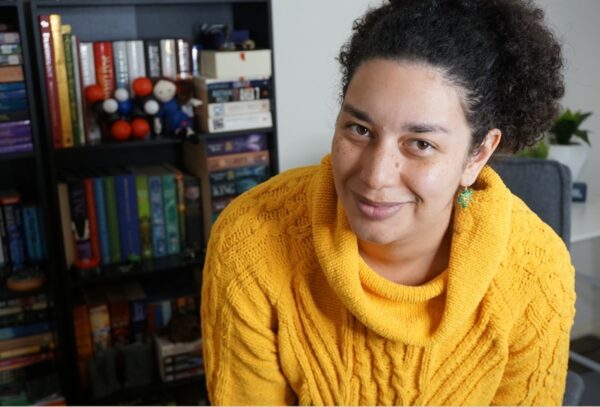
Recent posts
Green Libraries: How Sustainable Design is Shaping the Future of Public Libraries
In this week's Princh Library Blog post, recurring guest writer Sam L. Bowman discusses an ever so important topic: sustainable design and [...]
Librarians Supporting Digital Literacy in the Community
In this week's Princh Library Blog, Nina Grant covers why digital literacy is important, the variety of ways in which librarians are supporting [...]



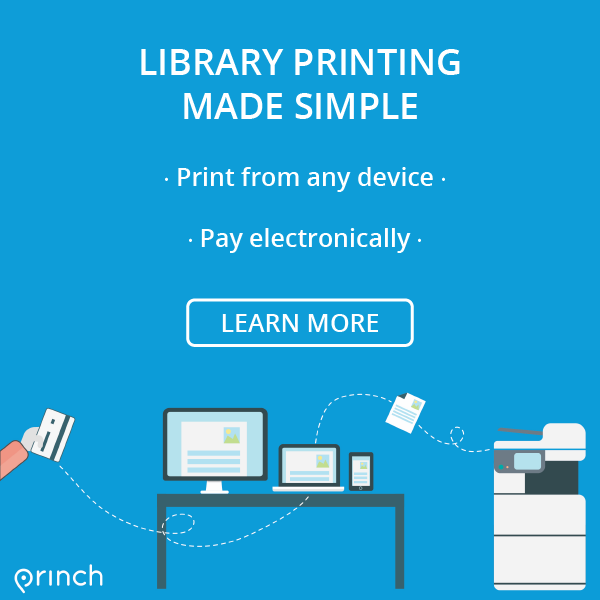

I just finished reading your blog and I have to say, it was an outright delight. Your writing practice is engaging and illustrative, making me feel like I was right there with you on your adventures. The picture you included were also remarkable and really added to the overall quest. good-luck
Nice information shared